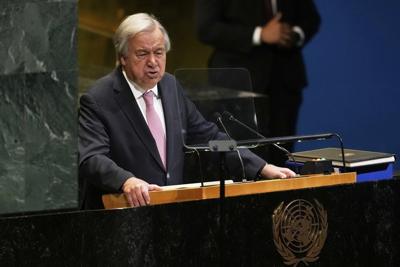UNITED NATIONS (AP) ŌĆö Soaring global military expenditures are reducing essential investments in health, education and job creation and donŌĆÖt guarantee peace, the United Nations chief warned on Tuesday.
Secretary-General Antonio Guterres said the evidence is clear that heavy military spending often undermines peace by ŌĆ£fueling arms races, deepening mistrust and diverting resources from the very foundations of stability.ŌĆØ
With to a record $2.7 trillion following a decade-long military build-up, the U.N. studied the impact on U.N. development goals for 2030. The resulting report, ŌĆ£The Security We Need: Rebalancing Military Spending for a Sustainable and Peaceful Future,ŌĆØ is expected to be discussed at the annual meeting of world leaders at the General Assembly starting Sept. 22.
The in 2015 include ending global hunger, promoting good health and providing quality education for every child, while . In his July report on the status of the goals in 2025, Guterres said only 35% of them are on track.
He said Tuesday his report is a call to action to rebalance global budgets and spending, stressing that the current trajectory of military spending is ŌĆ£unsustainable.ŌĆØ
ŌĆ£A more secure world begins by investing at least as much in fighting poverty as we do in fighting wars,ŌĆØ Guterres told U.N. reporters.
His report said that, according to the Stockholm International Peace Research Institute, last yearŌĆÖs $2.7 trillion in global military spending is projected to reach $6.6 trillion by 2035 if current trends persist. And increased military spending is widespread, with more than 100 countries boosting expenditures last year.
ŌĆ£Redirecting even a fraction of todayŌĆÖs military spending could close vital gaps,ŌĆØ Guterres said, ŌĆ£Putting children in school, strengthening primary health care, expanding clean energy and resilient infrastructure, and protecting the most vulnerable.ŌĆØ
Only $93 million ŌĆö less than 4% of the $2.7 trillion in military spending last year ŌĆö is needed annually to end hunger by 2030, the report said. And $5 trillion could fund 12 years of quality education for every child in low- and lower-middle-income countries.
While $1 billion in military spending can create approximately 11,200 jobs in the military, the report said the same amount of money can create 26,700 jobs in education, 16,800 in clean energy and 17,200 in health care.
U.N. disarmament chief Izumi Nakamitsu told reporters that ŌĆ£rebalancing global priorities is not optional ŌĆō it is an imperative for humanityŌĆÖs survival.ŌĆØ
Haoliang Xu, the U.N. Development ProgramŌĆÖs acting administrator, stressed that development is indispensable for maintaining international peace and security.
ŌĆ£When people live healthy, educated and fulfilling lives in dignity, their societies are often more peaceful,ŌĆØ he said. ŌĆ£And vice versa, societies with high poverty rates and underdevelopment often experience insecurity and violent conflicts.ŌĆØ
Nakamitsu was asked how the U.N. can convince countries to reduce their military spending and spend more on improving the lives of the worldŌĆÖs more than 8 billion people. ŌĆ£There is no one single silver bullet,ŌĆØ she said.
The aim of the report, Nakamitsu said, is to start a very serious conversation by the U.N.ŌĆÖs 193 member nations, and in the public, on rethinking how global security can be achieved by investing more in development and economic growth.
___

























